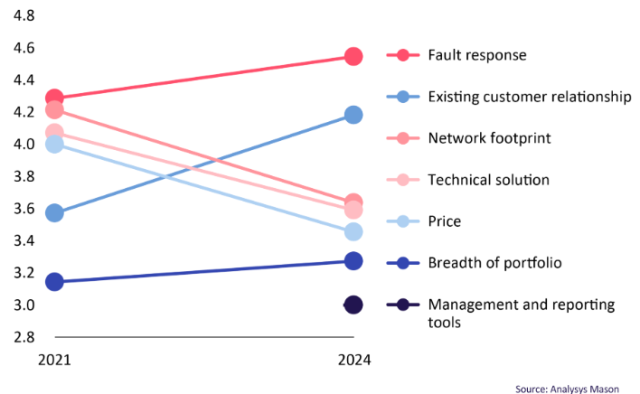Telecom operators need to differentiate their fixed enterprise connectivity services to retain existing customers and attract new ones, says Catherine Hammond, Research Director at Analysys Mason.

Revenue in the fixed data market) is projected to reach $0.5 trillion by 2028 from $0.4 trillion in 2024 with CAGR of 2.25 percent during 2024-2028.The size of the fixed data market in the United States will be $94 billion in 2024, according to another industry report.
Here are effective strategies for fixed service providers to achieve this differentiation:
- Prioritize Fault Response and Reliability
Fault response has become one of the most critical factors for enterprise customers when selecting connectivity providers. Operators should focus on meeting or exceeding their service-level agreements (SLAs) to enhance customer trust and minimize churn. They can also leverage analytics to provide transparent fault response reporting and highlight success stories in handling outages, especially during extreme weather events. Maintaining high fault response standards and robust processes, as exemplified by Deutsche Telekom, can foster customer loyalty and trust.
- Enhance Customer Satisfaction through Proactive Service Management
Maintaining positive relationships with existing customers is essential, as churn prevention has grown in importance. Operators should adopt a proactive approach by engaging regularly with customers, offering health checks on connectivity, and addressing potential issues before they escalate. Additionally, providing easy access to customer support and focusing on positive user experiences are essential for building long-term loyalty.
- Leverage Existing Customer Relationships to Reduce Churn
With the competitive landscape making new business harder to win, fixed service providers should capitalize on established relationships. Operators can use data and insights on customer usage patterns to tailor additional service offerings or upsell options, demonstrating an understanding of the client’s specific needs. Operators should ensure reliable service, as many enterprises prioritize stability and are less likely to switch providers if their needs are consistently met.
- Invest in Specialized Technical Solutions for Key Sectors
Although technical solutions have become less of a differentiator, some enterprise clients require high-bandwidth, secure, or automated connectivity solutions. Operators can focus on developing niche solutions, such as those with advanced security or automation features, for industries with stringent requirements (e.g., finance, healthcare). Early adoption of innovative solutions, such as quantum networking or identity management, can also offer a first-mover advantage in specific segments.
- Optimize Network Footprint Strategically
Operators should ensure comprehensive network coverage and, where feasible, work to enhance connectivity on key global routes that are underserved. Although direct network footprint is less of a differentiator in some regions, operators with a strong presence in key business districts or intercontinental routes can attract clients with unique connectivity needs. Providers that can deliver consistent, high-quality connectivity on specific, high-demand routes can leverage this as a selling point for global enterprises.
- Develop Managed Services and Bundled Offerings
Offering managed services can help fixed providers add value beyond basic connectivity. These can include managed security, network monitoring, and cloud services. By bundling connectivity with these services, operators can create comprehensive packages that address a range of enterprise needs, differentiating their offerings from competitors who provide connectivity alone.
- Use Data Analytics and AI to Drive Network Optimization
Operators should leverage data analytics to optimize network performance and predict potential issues before they impact customers. Although only a few operators have identified AI as a differentiator, AI-driven analytics for performance monitoring, traffic management, and predictive maintenance can enhance operational efficiency and provide a superior customer experience. This proactive approach can also support SLAs and bolster reliability, helping to differentiate the provider’s service quality.
- Implement Flexible Pricing and Transparent Cost Models
Although pricing is less influential than it once was, flexibility remains valuable, particularly for small to medium enterprises. Operators can introduce transparent, usage-based pricing models to accommodate businesses with fluctuating bandwidth requirements. Flexible pricing that scales with usage or is tailored to specific service bundles can appeal to price-sensitive customers without resorting to aggressive pricing cuts.
- Highlight and Market High-Quality SLAs and Certifications
In competitive markets, high-quality SLAs and certifications (such as ISO or security certifications) can serve as a mark of reliability. Operators should highlight these in marketing efforts, especially when targeting sectors like finance, government, or healthcare, which prioritize compliance and stringent reliability standards.
- Explore Strategic Partnerships with Cloud and Security Providers
Cloud connectivity and security are increasingly intertwined with fixed connectivity services. Partnering with cloud or security providers can help operators integrate additional services into their fixed connectivity offerings. These partnerships allow operators to offer end-to-end solutions that simplify the customer’s experience, adding value to connectivity while fostering new revenue streams in cloud and security services.
- Strengthen Reputation and Brand Trust
Brand reputation remains essential, particularly in markets where fixed connectivity has become commoditized. Operators should focus on building a reputation for reliability, transparency, and customer-centric solutions. Promoting case studies, client testimonials, and highlighting achievements (e.g., rapid recovery after service disruptions) can enhance trust and appeal to enterprises prioritizing stability.
Analysys Mason in its report said fixed service providers can follow these strategies in order to improve differentiation, retain customers, and capture market share in an environment where connectivity services are increasingly commoditized. Through proactive customer service, partnerships, and targeted managed services, providers can build a defensible position in the enterprise connectivity market.
